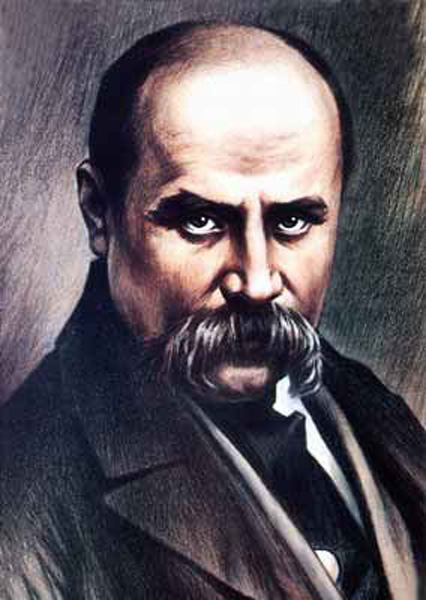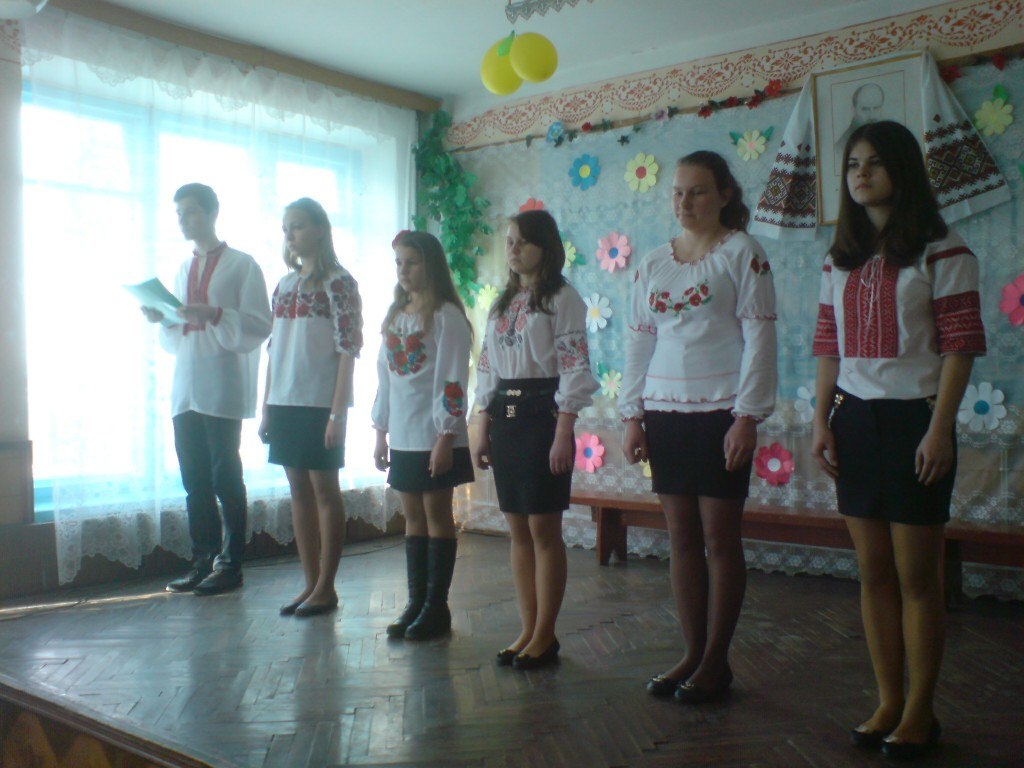- Преподавателю
- Иностранные языки
- Уссний літературний журнал на тему: Shevchenko in our heart
Уссний літературний журнал на тему: Shevchenko in our heart
| Раздел | Иностранные языки |
| Класс | - |
| Тип | Другие методич. материалы |
| Автор | Кравченко В.В. |
| Дата | 04.12.2015 |
| Формат | doc |
| Изображения | Есть |
Усний літературний журнал на тему:


Підготував і провів
вчитель англійської мови
Роставицької ЗОШ І - ІІІ ступенів
Кравченко В. В.
Мета: поглибити знання учнів про життєвий і творчий шлях Тараса Шевченка, розвивати образне й логічне мислення, пам'ять, увагу, допитливість учнів. Виховувати любов та інтерес до творчості видатного українського поета.
Обладнання: портрет поета, ілюстрації - cвітлини його біографії,
національні костюми.
Учасники: учні 5, 8, 9, 10, 11 класів одягнуті в національні костюми.
План заходу
-
Вірш «Портрет Тараса Шевченка» (англ. мовою). Кузнєцова Д.
-
Біографія Шевченка (англійською та українською мовою).
Назарчук О., Павлюк І.
-
Пісня «Думи мої» ( англ. мовою). Гопанчук Ю.
-
Вірш «Причинна» ( англ. мовою). Андрійчук Н.
-
Вірш «Заповіт» ( англ. мовою). Саківська О., Гнатюк Р., Назарчук О.
Taras Shevchenko
Compere: Artist, poet, national bard of Ukraine, Taras Shevchenko was born on 9 March, 1814 in Moryntsi, Kyiv gubernia. He was born a serf. When he was a teenager he became an orphan, and grew up in poverty. When he was 14, his owner, Engelhardt took him to serve as a houseboy. And Taras travelled with him to Vilnus and to St. Petersburg. In Vilnus Taras for the first time heard different languages, Lithuanian, Russian and Polish and there he saw people whom their masters made free. When Engelhardt noticed the boy's skills in painting he apprenticed him to the painter Shiriayev for four years.
Compere: At that time the young man met his compatriots Soshenko, Hrebinka, Venetsianov, they showed his works to the famous Russian artist Carl Briullov. Shevchenko's paintings impressed Briullov, and he decided to help him. Carl Briullov painted a portrait of the Russian poet Zhukovskyi and disposed it in a lottery. The money was used to buy Shevchenko's freedom from Engelhardt in 1838.
Compere: Shevchenko entered the Academy of Fine Arts in St. Petersburg, there he became a student of Briullov. Shevchenko was awarded three silver medals for his works and later he had become an Academician in engraving.
Compere: Studying at the Academy T. Shevchenko understood that his main calling, his true passion was poetry. In 1840 he published his first collection of poems "Kobzar". In 1841 followed the epic poem "Haidamaky", in 1844 the ballad "Hamalia".
Compere: When he graduated from the Academy, he became a member of the Kyiv Archeographic Commission. In 1846 in Kyiv he entered the secret Cyril and Methodius Brotherhood. It was a secret political society, in 1847 it was smashed, and Shevchenko was arrested and sent to the Orenburg special corps, he was deprived the right to draw and write. 10 years of exile ruined his health, and Shevchenko became seriously ill.
Compere: When he was released in 1857 it was forbidden to him to live in Ukraine. He moved to St Petersburg but on March 10, 1861 the great poet died of heart disease. He was buried in St. Petersburg, but his friends wanted to fulfil the poet's wish that he had expressed in his "Testament" and they transferred his remains to the Chernecha Hill near Kanev, in Ukraine.
Compere: Shevchenko was an outstanding poet and a highly accomplished artist. There are 835 works written by him, although 270 are known to have been lost. His collection also contains over 150 portraits, 42 self-portraits. There are many landscapes, watercolours and etchings.
Тарас Шевченко
Ведуча: Художник, поет, національний бард України Тарас Шевченко народився 9 березня 1814 року в Моринцях Київської губернії. Він народився кріпаком. Коли він був підлітком, став сиротою і ріс в бідності. Коли йому виповнилось 14 років, Енгельгардт узяв його до себе козачком. Тарас подорожував з ним до Вільнюса і до Санкт-Петербурга. У Вільнюсі Тарас вперше почув іноземні мови: литовську, російську та польську, і побачив людей, звільнених з кріпацтва. Коли Енгельгардт відмітив, що у хлопчика є здібності до малювання, то віддав його на навчання художникові Ширяєву на чотири роки.
Ведуча: В цей час молодий чоловік зустрів своїх земляків: Сошенка, Гребінку, Венеціанова. Вони показали його роботи відомому російському художнику Карлу Брюлову. Роботи Шевченка вразили Брюлова, і він вирішив допомогти йому. Брюлов намалював портрет російського поета Жуковського і виставив його на продаж. За виручені гроші він викупив в Енгельгардта Шевченка з кріпацтва в 1838 році.
Ведуча: Шевченко вступив до Академії мистецтв в Санкт-Петербурзі і став учнем Брюлова. За свої роботи Шевченко був нагороджений трьома срібними медалями, і згодом він став академіком по гравіюванню.
Ведуча: Під час начання в Академії Шевченко зрозумів, що його головне покликання і справжня пристрасть - поезія. У 1840 році він опублікував свою першу збірку віршів «Кобзар». У 1841 році вийшла епічна поема «Гайдамаки», в 1844 році - балада «Гамалія».
Ведуча: Після закінчення академії Шевченко став членом Київської археографічної комісії. У 1846 році він увійшов до таємного Кирило-Мефодієвського братства. Це була таємна політична спілка, яку в 1847 році розігнали, а Шевченка арештували і вислали в спеціальний корпус до Оренбургу. Його позбавили права малювати і писати. 10 років заслання підірвали його здоров'я і Шевченко серйозно захворів.
Ведуча: Він був звільнений в 1857 році, але йому заборонили жити в Україні. Він поїхав до Санкт-Петербурга, але 10 березня 1861 року великий поет помер від хвороби серця. Його поховали в Санкт-Петербурзі, але його друзі хотіли виконати волю поета, яку він виразив в своєму «Заповiтi», і перевезли його останки на Чернечу гору біля Канева, в Україні.
Ведуча: Шевченко був видатним поетом і прекрасним художником. Він написав 835 робіт, 270 з яких було втрачено. У його колекцію також входить 150 портретів, 42 автопортрети, багато пейзажів, акварелей і гравюр.

Вступне слово вчителя.
До вашої уваги усний літературний журнал на тему:
"Shevchenko in our heart", що в перекладі на українську мову означає «Шевченко у нашому серці».
Саме в березні відзначають день народження та вшанування пам'яті Тараса Шевченка.
Він відомий не лише в Україні , а й закордоном. Його твори перекладені на багато мов, в тому числі й на англійську.
Заключне слово вчителя.
На цьому наш захід закінчився. Дякую всім за увагу.
Окрема подяка учасникам, які допомогли мені у проведенні заходу.
Taras Shevchenko's portrait
Shevchenko has smiled to me today
From the picture, that on the wall there.
Reads his poems are willing mother,
Father had told me:
As he was herding sheep - another boy was a lad,
And grew the great gave the gift:
For all generations, for the whole Country,
This book, which is called "Kobzar".
As the Holy book we kept stubbornly,
With a claimed in the world,
So the word of Taras always saves,
Big all the Testament.
I'II be love my native Country,
It might me again
With picture kindly smile Shevchenko,
Our Father, the great Taras.
My thoughts
Thoughts my, thoughts my,
Trouble to me with you!
Why became on a paper
By sad rows?.
Why you wind did not blow about
In steppe, how pylyny?
Why you trouble did not put to sleep,
How the child?.
Causation
The mighty Dnieper roars and bellows,
The wind in anger howls and raves,
Down to the ground it bends the willows,
And mountain-high lifts up the waves.
The pale-faced moon picked out this moment
To peek out from behind a cloud,
Like a canoe upon the ocean
It first tips up, and then dips down.
The cocks don't crow to wake the morning,
There's not as yet a sound of man,
The owls in glades call out their warnings,
And ash trees creak and creak again.
Testament
When I am dead, bury me
In my beloved Ukraine,
My tomb upon a grave mound high
Amid the spreading plain,
So that the fields, the boundless steppes,
The Dnieper's plunging shore
My eyes could see, my ears could hear
The mighty river roar.
When from Ukraine the Dnieper bears
Into the deep blue sea
The blood of foes … then will I leave
These hills and fertile fields -
I'll leave them all and fly away
To the abode of God,
And then I'll pray …. But till that day
I nothing know of God.
Oh bury me, then rise ye up
And break your heavy chains
And water with the tyrants' blood
The freedom you have gained.
And in the great new family,
The family of the free,
With softly spoken, kindly word
Remember also me.


